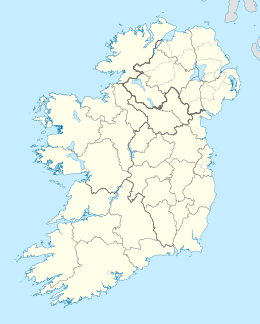Great Blasket Island
| Native name: An Bhlascaod Mór | |
|---|---|

Great Blasket from Dunmore Head
|
|
| Geography | |
| Location | Atlantic Ocean |
| Coordinates | 52°5.37′N 10°32.16′W / 52.08950°N 10.53600°WCoordinates: 52°5.37′N 10°32.16′W / 52.08950°N 10.53600°W |
| Archipelago | Blasket Islands |
| Major islands | Great Blasket Island, Beginish, Inishnabro, Inishvickillane, Inishtooskert, Tearaght Island |
| Area | 4.29 km2 (1.66 sq mi) |
| Highest elevation | 292 m (958 ft) |
| Highest point | An Cró Mór |
| Administration | |
| Province | Munster |
| County | Kerry |
| Demographics | |
| Population | 0 (2011) |
| Pop. density | 0 /km2 (0 /sq mi) |
| Additional information | |
| inhabited until 1953 | |
Great Blasket (An Blascaod Mór in Irish) is the principal island of the Blaskets, County Kerry, Ireland.
The island lies approximately 2 km from the mainland at Dunmore Head, and extends 6 km to the southwest, rising to 292 metres at its highest point (An Cró Mór). The nearest mainland town is Dunquin; a ferry to the island operates from a nearby pier during summer months. Despite its close proximity to the mainland, visitors to the Dingle coast can often not see the island through the notorious sea mist.
The most easterly extremity of the island, Garraun Point at 52°06′16″N 10°30′27″W / 52.1045°N 10.5074°W has been incorrectly cited as being the most westerly point of the Irish mainland.
The island was inhabited until 1953, when the Irish government decided that it could no longer guarantee the safety of the remaining population. It was the home of three noted Irish writers: Tomás Ó Criomhthain, Peig Sayers and Muiris Ó Súilleabháin. Their works were all written in Irish, and have all been translated into English, as well as other languages. The homes of Tomás Ó Criomhthain and Muiris Ó Súilleabháin are now in ruins but the house in which Sayers once lived has been restored, and used to form part of the hostel which previously functioned on the island.
Until 1953, the inhabitants of Great Blasket Island formed the most westerly settlement in Ireland. The small fishing community (even at its peak the population was hardly more than 150) mostly lived in primitive cottages perched on the relatively sheltered north-east shore. In April 1947, having been cut off from the mainland for weeks due to bad weather, the islanders sent a telegram to the Taoiseach, Éamon de Valera, urgently requesting supplies which duly arrived two days later by boat.
...
Wikipedia

